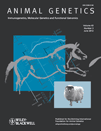
GENES & GENETIC SYSTEMS
Scope & Guideline
Fostering Collaboration in Molecular Biology
Introduction
Aims and Scopes
- Genomic and Molecular Genetics:
The journal emphasizes research on the structure, function, and regulation of genes at the molecular level, including studies on gene expression, epigenetics, and the impact of genetic variations. - Evolutionary Biology and Genetics:
It covers the evolutionary implications of genetic changes, including population genetics and the role of transposable elements in evolution, highlighting how genetic systems contribute to biodiversity. - Plant and Animal Genetics:
Research on genetic diversity and adaptation in both plant and animal species is a key focus, with studies employing various genetic markers and sequencing technologies to understand evolutionary processes. - Technological Innovations in Genetic Research:
The journal promotes innovative methodologies such as next-generation sequencing, CRISPR technologies, and bioinformatics approaches that enhance the understanding of genetic systems. - Functional Genomics and Disease Genetics:
There is a significant emphasis on the relationship between genetic factors and diseases, exploring how genetic variations can influence susceptibility and disease mechanisms.
Trending and Emerging
- Transposable Elements and Genomic Evolution:
Increasing attention is being directed towards understanding the role of transposable elements in genomic architecture and their influence on evolution, reflecting a growing interest in genome dynamics. - CRISPR and Gene Editing Technologies:
The application of CRISPR and other gene editing technologies is trending, as researchers explore their potential for functional studies and therapeutic applications, indicating a shift towards precision genetics. - Environmental Genomics and Stress Response:
Research exploring the genetic basis of environmental stress responses in organisms is on the rise, reflecting the importance of understanding adaptation mechanisms in changing ecosystems. - Integrative Genomics and Multi-Omics Approaches:
There is a notable trend towards integrating various omics data (genomics, transcriptomics, proteomics) to provide comprehensive insights into biological processes, emphasizing a systems biology approach. - Cancer Genomics and Precision Medicine:
The focus on cancer genetics, particularly the identification of genetic markers for prognosis and therapy personalization, is increasingly prominent, showcasing the intersection of genetics and clinical applications.
Declining or Waning
- Classical Genetics:
Research that primarily focuses on classical Mendelian genetics appears to be less prominent, as the field shifts towards molecular and genomic approaches that provide deeper insights into genetic mechanisms. - Single-Species Studies:
There is a noticeable decrease in studies that focus exclusively on single species without broader implications or comparative analyses, as researchers increasingly favor studies that enhance understanding across multiple taxa. - Traditional Breeding Techniques:
The application of traditional breeding methods in genetic studies has waned, with a growing emphasis on molecular techniques and genetic engineering that offer more precise outcomes. - Static Genetic Models:
Research relying on static models of genetic inheritance is declining in favor of dynamic models that consider environmental interactions and epigenetic factors influencing gene expression.
Similar Journals

GENETICA
Illuminating Genetic Discoveries Across DisciplinesGENETICA is a prominent journal published by SPRINGER, dedicated to advancing the field of genetics and its applications across various biological disciplines, including animal science, plant science, and insect science. Since its inception in 1919, the journal has consistently served as a vital platform for researchers and professionals to disseminate high-quality research findings that explore the genetic bases of biological phenomena. With its current scope spanning from 1943 to 2024, GENETICA holds a commendable position in the academic community, as evidenced by its Q2 ranking in both animal science and insect science, and its active contribution to interdisciplinary studies in genetics. Although the journal does not offer open access, it remains accessible through institutional subscriptions and libraries, ensuring its vital research is widely circulated. Researchers, professionals, and students alike will find GENETICA an invaluable resource for the latest discoveries and methodologies in the ever-evolving landscape of genetics.

Vavilovskii Zhurnal Genetiki i Selektsii
Bridging Research and Application in GeneticsVavilovskii Zhurnal Genetiki i Selektsii, with ISSN 2500-0462 and E-ISSN 2500-3259, is a distinguished open-access journal published by the Russian Academy of Sciences, Institute of Cytology and Genetics. Since transitioning to open access in 2013, the journal has been dedicated to advancing research and discourse in the fields of genetics and selection, particularly within agricultural and biological sciences. With a current ranking of Q2 in Agricultural and Biological Sciences and Q3 in Biochemistry, Genetics and Molecular Biology according to Scopus, it serves as a pivotal platform for researchers, professionals, and students to disseminate their findings and collaborate on innovative ideas. The journal, housed in the vibrant academic environment of Novosibirsk, Russia, publishes a diverse range of articles that contribute to the ongoing evolution of genetic studies and practical applications in agriculture. Its commitment to quality and accessibility ensures it plays an essential role in the global scientific community, fostering knowledge that bridges theoretical research and practical implementation.

INTERNATIONAL JOURNAL OF HUMAN GENETICS
Exploring the Depths of Genetic KnowledgeINTERNATIONAL JOURNAL OF HUMAN GENETICS is a distinguished publication dedicated to advancing knowledge in the fields of genetics and molecular biology. Published by KAMLA-RAJ ENTERPRISES, this journal explores critical developments and research findings from 2008 to 2016, though its coverage in Scopus has since been discontinued. With an ISSN of 0972-3757 and an E-ISSN of 2456-6330, the journal aimed to foster scholarly dialogue and serve as a resource for researchers, professionals, and students engaged in human genetics. While the journal holds a modest ranking in categories such as Biochemistry and Genetics, it remains a vital source for exploring niche topics within the realm of human genetics. Researchers interested in genetic screening, gene therapy, and clinical genetics will find valuable insights herein. Despite its pause in indexing, the journal continues to contribute to the academic discourse by disseminating critical research that bridges gaps in understanding human genetics.

PLoS Genetics
Fostering global collaboration in the realm of genetics and molecular biology.PLoS Genetics, published by the PUBLIC LIBRARY SCIENCE, is a leading open-access journal dedicated to advancing the field of genetics, molecular biology, and related disciplines. With its ISSN of 1553-7404, this esteemed journal has been offering unrestricted access to its content since 2005, fostering a global community of researchers, professionals, and students. Situated in the United States, its contributions can be found at 1160 Battery Street, Ste 100, San Francisco, CA 94111. As of 2023, PLoS Genetics proudly holds a Q1 ranking in multiple categories including Cancer Research, Ecology, Evolution, Behavior and Systematics, Genetics, and Molecular Biology, underscoring its impact in these vital scientific areas. The journal's commitment to disseminating high-quality research is reflected in its impressive Scopus rankings, with notable positions in various fields of study, ensuring that it remains a crucial resource for cutting-edge research and innovation. By providing an open-access platform, PLoS Genetics not only enhances the visibility of genetic research but also encourages collaborations and the sharing of knowledge that can lead to significant breakthroughs in science.

ANIMAL GENETICS
Illuminating Genetic Pathways in Animal ResearchANIMAL GENETICS, published by WILEY, is a leading journal in the fields of Animal Science and Zoology, with a commendable Q1 classification for 2023, reflecting its critical role in advancing research and knowledge in animal genetics. Established in 1986, this journal has become a cornerstone for professionals, researchers, and students alike, providing a platform for innovative research that explores the genetic underpinnings of animal biology. With an ISSN of 0268-9146 and an E-ISSN of 1365-2052, it boasts a significant impact in both agricultural and biological sciences, as indicated by its ranking of #74 out of 490 in its category on Scopus, positioning it in the 85th percentile for Animal Science and Zoology. Readers can access high-quality, peer-reviewed articles that not only illuminate current advancements but also foster future research directions. While currently not an open access journal, ANIMAL GENETICS remains vital for anyone engaged in the exploration of genetics and its applications in medicine and beyond, with a continual commitment to publishing findings that shape the future of animal breeding, conservation, and genetics research.

Genetics Research
Driving Progress in Genetic and Medical SciencesGenetics Research, published by HINDAWI LTD, is a distinguished open access journal that has been at the forefront of genetic studies since its inception in 1960. With the transition to open access in 2019, this journal has expanded its accessibility, fostering knowledge dissemination across the global scientific community. Operating out of the United Kingdom, it provides a platform for innovative research in the fields of genetics and molecular biology, encompassing a broad range of topics that are highly relevant to medical sciences. As of 2023, it holds a Q4 classification in Genetics and a Q3 classification in miscellaneous Medicine, reflecting its ongoing commitment to scholarly excellence amidst shifting academic landscapes. While the journal's H-index remains unlisted, its indexed ranking within Scopus, with a rank of #325/328 in the Genetics category highlights the challenges ligated to its niche audience. Nevertheless, it serves as a crucial resource for researchers, professionals, and students eager to contribute to and stay informed on the latest genetic research trends and breakthroughs.

JOURNAL OF MEDICAL GENETICS
Transforming Genetic Discoveries into Clinical Applications.JOURNAL OF MEDICAL GENETICS, published by the BMJ PUBLISHING GROUP, stands as a premier platform in the field of genetics, focusing on both fundamental genetic research and its clinical applications. With a distinctive legacy dating back to 1965 and a significant role in advancing the understanding of genetic disorders, this journal has established itself in the top tiers with a commendable Q1 category ranking in both Genetics and Clinical Genetics as of 2023. The journal's impact is underscored by its Scopus rankings, placing it among the leading journals in the fields of medicine and genetics. Researchers and practitioners are drawn to its rigorous peer-review process and its commitment to disseminating high-quality research findings, critical reviews, and innovative clinical practices. While it is not an open-access journal, the insights provided are invaluable for anyone looking to deepen their knowledge or contribute to the burgeoning field of medical genetics.

HUMAN GENETICS
Advancing the frontiers of genetics research.HUMAN GENETICS, published by SPRINGER, stands as a cornerstone journal in the field of genetics, offering a wealth of research insights since its inception in 1964. Hailing from Germany, this esteemed journal boasts an impressive Q1 ranking in both Genetics and Clinical Genetics, marking it among the top quartile of journals in these categories for 2023. With a notable Scopus rank of #7 in Clinical Genetics and a percentile ranking of 93, HUMAN GENETICS attracts significant attention from researchers and professionals dedicated to advancing our understanding of genetic influences on human health and disease. Although it does not currently offer Open Access options, the journal provides a critical platform for scholarly communication, aimed at disseminating groundbreaking findings in genetics and biotechnology. As the field evolves, HUMAN GENETICS continues to play an instrumental role in bridging the gap between laboratory research and clinical application, making it an essential resource for students and seasoned researchers alike.

MOLECULAR GENETICS AND GENOMICS
Connecting Research and Discovery in Molecular GeneticsMOLECULAR GENETICS AND GENOMICS is a distinguished journal published by SPRINGER HEIDELBERG that serves as a pivotal platform for the communication of cutting-edge research and developments in the fields of genetics, molecular biology, and medicine. With an ISSN of 1617-4615 and an E-ISSN of 1617-4623, this journal has established itself since its inception in 1994 as a significant resource for researchers aiming to explore the complexities of genetic interactions and their implications in various biological systems. The journal is indexed in Scopus, with respectable rankings in the Genetics, Molecular Biology, and Biochemistry categories, showcasing its position within the academic community. It is categorized in the 2023 rankings as Q3 in Genetics, Q2 in Medicine (miscellaneous), and Q3 in Molecular Biology, indicating its relevance and quality in the scientific discourse. The journal also promotes open access, ensuring that researchers and professionals can easily share and advance knowledge in the rapidly evolving disciplines of molecular genetics and genomics. As the journal continues to bridge the gap between experimental and theoretical research, it presents a vital space for innovation, fostering collaborations and scholarly exchange among its readership.

RUSSIAN JOURNAL OF GENETICS
Pioneering Insights into Genetic DiscoveriesRUSSIAN JOURNAL OF GENETICS is a significant platform in the field of genetics, published by PLEIADES PUBLISHING INC since its inception in 1996. With an ISSN of 1022-7954 and an E-ISSN of 1608-3369, the journal focuses on a wide array of topics within genetics, providing researchers, professionals, and students with insights into advancements and discoveries in this ever-evolving discipline. While it currently holds a Q4 ranking in the 2023 Genetics category according to Scopus, representing invaluable opportunities for knowledge dissemination, the journal is actively working to enhance its impact in future rankings. Readers will find the journal a repository of diverse genetic research findings, methodologies, and theoretical advancements. Although it is not an open-access journal, it is committed to serving the academic community through rigorous peer-reviewed articles. With a consistent publication trajectory spanning to 2024, the RUSSIAN JOURNAL OF GENETICS remains a crucial resource for those aspiring to stay at the forefront of genetic research and applications.